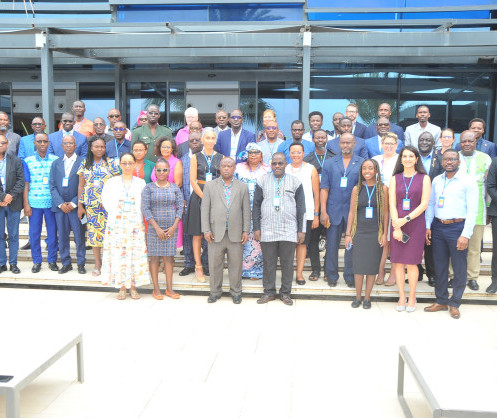FIND, the global alliance for diagnostics, and the African Society for Laboratory Medicine (ASLM), in collaboration with Africa Centres for Disease Control and Prevention (Africa CDC), hosted representatives from 15 West African nations with the aim of accelerating access to essential diagnostics across the region. The first-of-its-kind event, held in Dakar, Senegal, on 20–21 October 2022, brought together ministry and laboratory network representatives, as well as partners from leading global health institutions.
The 15 countries represented were: Benin, Burkina Faso, Cape Verde, Côte d’Ivoire, The Gambia, Ghana, Guinea-Bissau, Guinea, Liberia, Mali, Niger, Nigeria, Senegal, Sierra Leone, and Togo.
Diagnostic testing is integral to healthcare access and delivery, from primary care to laboratory services, and is a key enabler of universal health coverage (UHC). Latest research from the Lancet Commission on diagnostics (https://bit.ly/3srmDBb) shows that only 1 in 2 people has access to basic testing services – yet reducing the diagnostic gap for just six priority conditions could avert 1.1 million premature deaths in low- and middle-income countries every year.
The World Health Organization maintains a model Essential Diagnostics List (EDL) (https://bit.ly/3DpMqzS) – a basket of recommended types of tests to support the diagnosis of infectious and non-communicable diseases at each level of the healthcare system in settings with and without laboratories. Provided as a reference guide and benchmark, this list is not prescriptive and should be tailored by individual nations to meet specific population health needs.
Last week’s event aimed to kick-start the development of national EDLs across West Africa, as a lever to increase primary care-level access to essential tests (in vitro diagnostics and imaging), to strengthen key health infrastructures, and accelerate national and regional progress towards UHC.
We must also make sure that every lab is stocked with the right equipment, tests and reagents – and that these supplies are sustainable
Held over 2 days, delegates were welcomed by Professor Amadou Moctar Dieye, the Director of Laboratories in Senegal, with speakers and panellists including representatives from FIND, Africa CDC, ASLM, the West African Health Organization (WAHO), Nigerian Ministry of Health, the Lancet Commission, the World Bank and DATOS.
Attendees were invited to explore the landscape surrounding the selection, availability and uptake of essential diagnostics, and to map their individual route towards national EDLs. Key themes that emerged from discussions included: the importance of mapping existing diagnostic networks to understand gaps,and identify and prioritize actions; the need to strengthen surrounding health infrastructures, including laboratory services; the importance of embedding action within an enabling policy framework; and the need to secure sustainable financing that cuts across multiple diseases to meet identified priorities.
Professor Amadou Moctar Dieye, Director of Laboratories in Senegal said: “We cannot close the gap in diagnostics without investing in human resources and increasing the number of qualified laboratory scientists and technicians we have in our countries. We must also make sure that every lab is stocked with the right equipment, tests and reagents – and that these supplies are sustainable. By setting these priorities and building this foundation, we can start to move diagnostic capacity in the right direction.”
Dr Abdourahmane Sow, Head of Epidemic and Public Health Laboratories Networks and Systems at WAHO said: “Strong laboratory leadership and governance together with the development and securing of sustainable funding mechanisms will significantly strengthen laboratory systems in West Africa.”
Dr Pascale Ondoa, Director of Science and New Initiatives at ASLM said: “We need to rationalize the investments in diagnostics to ensure that they translate into more robust and sustainable improvements of patient and public health outcomes.”
Dr Aytenew Ashenafi Eshete, Program Manager at Africa CDC said: “This regional workshop is an ideal forum to explore, discuss, connect and share best practices in the NEDL development process in order to cement diagnostics as an important component in health care.”
Dr Sanjay Sarin, Vice President, Access at FIND, said: “Gaps in testing are greatest in low- and middle-income settings, where disease burdens are highest and health systems are most fragile – in some cases essential tests are available at just 1% of primary care clinics. These include basic biochemistry and haematology tests; tests for HIV, TB, malaria, syphilis, and hepatitis. These are treatable diseases that no one should still be dying from in 2022, but for which too many people don’t even know they have until it’s too late. Developing and implementing national EDLs is a critical step in accelerating access to diagnosis and ensuring that health systems can meet the needs of the patients they exist to serve.”







OTHER ARTICLES
Strengthening pandemic prevention, preparedness, and response capacities in Senegal using the “One Health” approach
Africa Health Brief
Sex, Gender, and Medicine: Understanding Errors in Sex Assignment